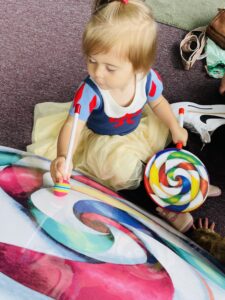Meet Music Therapist, Denise Travis:
We are excited to re-introduce to you, Denise Travis! Denise is a music therapist contractor who started working with Harmony Garden in October 2022. You might not spot her on-site often… She’s most seen in our early childhood centers or with our hospice patients in the Lansing area. But trust me, her tunes are resonating far and wide, especially in the world of early childhood development.
Let’s Start with some Fun Facts About Denise
- Fact #1: Temple Grandin once came to observe one of Denise’s music therapy sessions at MSU. (Temple Grandin is an accomplished scientist, professor, and advocate for individuals with autism, known for her groundbreaking work in animal science and her unique perspective as someone on the autism spectrum.)
- Fact #2: Denise is a part of a trivia team who competes for fun regularly in the Lansing area!
- Fact #3: Denise is on a mission to ride her bike to every public library in Michigan. When you see her, as her how many she has already biked to!
Denise’s Education and Experience:
Denise’s music therapist journey began at Michigan State University, where she earned her Bachelors and Masters of Music Therapy. She’s worked as a music therapist with Michigan State University, University of Michigan, and Eastern Michigan. Her experience is extensive, with 24 years as a board certified music therapist who is now a part of the Harmony Garden team. Not just a therapist, Denise has been teaching early childhood music at the MSU Community Music School since 2006. And if that’s not enough, she holds additional certifications in Early Childhood Music and rocks as a certified Drums Alive Basic and Ability Beats instructor.
A Transformative Moment in the Therapy Session:
“During my undergraduate practicum, I worked with a young autistic child. This child was working on hand-eye coordination and motor skills, learning to catch a ball. Using preferred music, songs with a strong steady beat provided motivation and auditory cues. This paired with hand-over-hand tactile cues, we practiced until he was able to catch the ball independently. The first time he caught the ball himself, we could head his dad shout from the observation room, “Atta boy!!” This made the child beam with pride. A few weeks later, his parents reported that he was playing catch with a peer at recess. Not only had his time in music therapy helped improve his motor skills and hand-eye coordination, it boosted his self-esteem and confidence. This focused skill work led to increased social skills allowing him to relate to a peer outside of music. I knew in that moment, I had found my forever career!”
Tailoring Sessions with Heart:
It is so important to meet each child where they are at and to create musical experiences tailored to their unique needs. This allows space to provide scaffolding around their skills through success based musical experiences. It helps them learn and grow, whether in individual sessions or group work. An example in building of skills: some kiddos start with knee-patting beats, others move to pat-claps, and the “pros” might even add to tap-pat-clap. It’s all about creating a musical playground where each child shines at their rhythm.
The Magic of Music Learning Theory (MLT):
Music Learning Theory (MLT) is an educational framework and philosophy developed by music educator Edwin E. Gordon. It is designed to explain how individuals learn music and how music learning can be effectively facilitated. The theory is rooted in the idea that musical development is a natural process. Much like language development, and it emphasizes the importance of early and immersive musical experiences.
“I’ve found that using Music Learning Theory (MLT) in my work with little ones has been a total game-changer. I make sure they’re surrounded by different rhythms and musical elements. MLT is all about making music without lyrics. Allowing a child’s brain to focus on the cool parts like rhythm, pitch, and melody without the distraction of words. And you know what’s cool? It helps them work on speech and language elements. Elements such as breath work, making sounds, and expressing themselves, all without the hurdle of words and language.”
It’s music magic for developing brains!
Music as an Equalizer:
According to Denise, “Music tends to help create a more even playing field for all children participating in music classes. With appropriate support, most kids can participate successfully in music. Every early childhood music therapy group I lead features movement, opportunities for the kids to make suggestions and choices, and encourages learning through musical games and experiences. Structuring activities to be success oriented not only helps children learn music, but helps with self-esteem and confidence which promotes success in all areas of development.”
Facility Magic at ABC Academy:
“The most satisfying aspect of teaching early childhood music therapy groups at ABC Academy is watching the kids find success, and watching their skills grow. On one occasion, a child who was having a hard time self-regulating after a disappointment that occurred before class. However, before the end of the hello song routine, they stopped crying. By the end of the first activity they were sitting in the circle with their peers. By the end of the class, they were participating fully! After the goodbye song, this kiddo offered me a high-five, with a smile, ready to face the rest of their day!
On another occasion, a child who often avoids group activities walked right up to me, began to sing along, and copied my motor movements. The classroom teacher reported it was the greatest group engagement they had seen from this student. Music was motivating enough for them to join the group, overcoming sensory overstimulation issues, and letting them shine!”
We hope you enjoyed being re-introduced to Denise Travis and getting to read about how she uses the power of music therapy in every session! With over 20 years of expertise, Denise has even more stories of success in early childhood music therapy and beyond, creating moments that resonate with each child’s unique journey.




